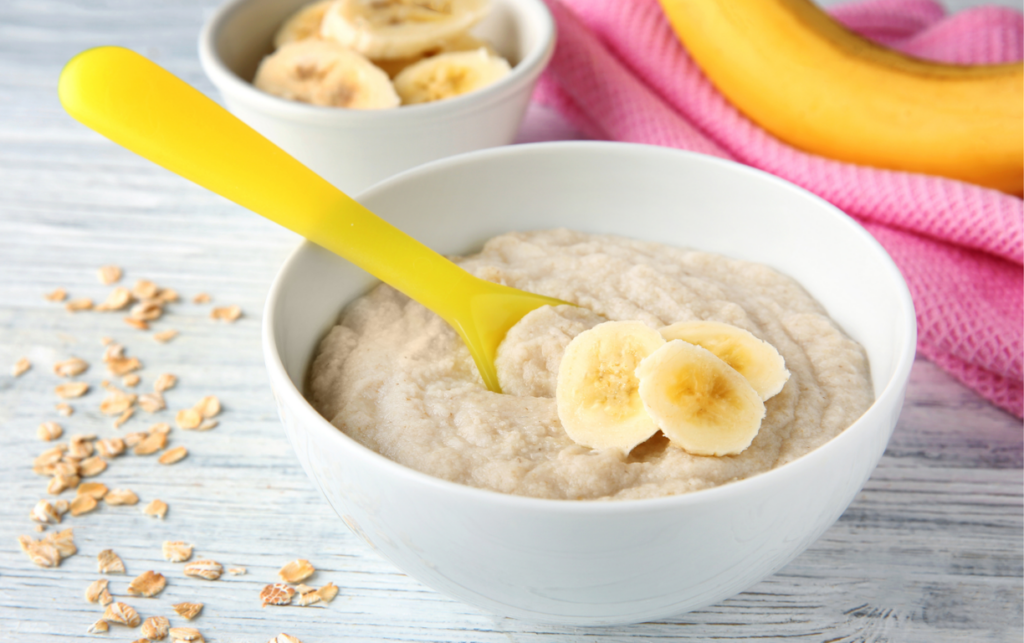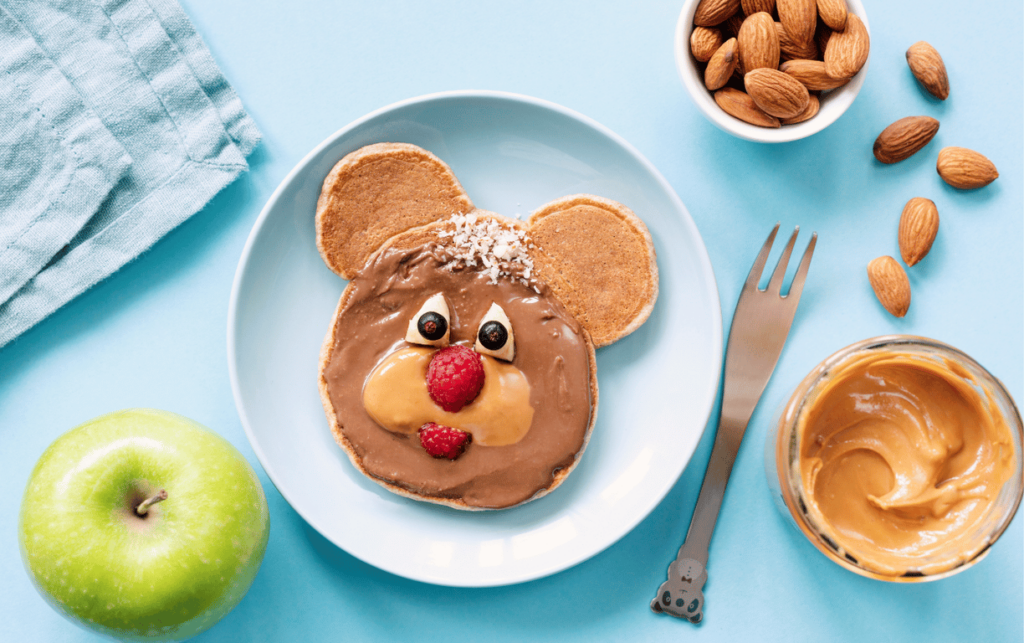Physical Address
304 North Cardinal St.
Dorchester Center, MA 02124
Physical Address
304 North Cardinal St.
Dorchester Center, MA 02124
Starting your baby’s day with a healthy breakfast is important for their growth and development. You can prepare quick and nutritious meals that are both tasty and easy to make. From creamy oatmeal to fluffy pancakes, there are many baby breakfast recipes that can suit your little one’s taste buds and nutritional needs.

Choosing the right ingredients is key. Incorporating fruits, veggies, and whole grains not only provides essential nutrients but also introduces your baby to a variety of flavors. Finding the right combinations can make mealtime enjoyable for both you and your baby.
As you explore different options, remember that breakfast sets the tone for the day. Preparing meals ahead of time can save you effort during busy mornings while ensuring your baby gets the nutrition they deserve.

Nutrition is essential for your baby’s growth and development. Focusing on the right nutrients in breakfast can set a solid foundation for your little one’s health. Let’s look at the key nutrients babies need and why a balanced breakfast is critical.
Your baby requires several essential nutrients for proper growth. Here are some key nutrients to include in their breakfast:
Including a variety of these nutrients ensures your baby is getting balanced meals and growing properly.
A balanced breakfast fuels your baby for the day ahead. It helps prevent irritability and keeps their energy levels steady. Here’s why balance matters:
Choosing healthy baby breakfast ideas, like iron-fortified cereals or yogurt with fruit, can provide a great start to their day. This balance benefits both you and your little one.
Getting your baby ready for breakfast can set the tone for a great day. With a little planning, you can create a safe and healthy morning routine that your baby will enjoy.
Having a consistent morning routine helps your baby know what to expect. Start by waking up at the same time every day. This promotes healthy sleep patterns.
Next, include activities such as reading a short story or playing quietly together. This makes breakfast time a calm and joyful experience.
When it’s time to eat, seat your baby safely in their high chair. Use cheerful plates and utensils to make mealtime fun.
Set the table with healthy options, like fruits and soft scrambled eggs. Making breakfast a regular part of their day helps build good habits for the future.
When choosing foods for your baby, safety is key. Stick to soft and easy-to-chew options, especially for younger babies.
Here are some great choices:
Always ensure that foods are cooked or prepared to avoid choking hazards. Cut items into small pieces and avoid hard foods.
Don’t forget to follow your baby’s cues. If they seem uninterested or fussy, it may be a sign to adjust the menu or timing.
Being aware of food allergies is crucial. Introduce new foods one at a time and wait a few days before trying something else. This way, you can monitor for any reactions.
Common allergenic foods include:
If you notice any signs like rashes, swelling, or unusual behavior, consult your pediatrician. It’s always best to err on the side of caution.
By being mindful of allergies, you can ensure that breakfast remains a safe and enjoyable time for your little one.
Starting your baby’s day with a nourishing breakfast sets a great tone for their meals. Here are some easy recipes that you can quickly prepare, as well as tips for making breakfasts ahead of time. You will also find ideas that suit baby-led weaning.
When mornings are busy, simple recipes come to the rescue. Consider making oatmeal with mashed bananas. It’s high in fiber and easy for your baby to eat.
These recipes are not only quick but also delicious. They give your baby a great start to the day!
Prep work can save you time and stress during busy mornings. Make muffins or pancakes in advance to freeze.
You can also prepare small veggie omelets and freeze them. Just heat them up for a nutritious meal ready in minutes!
If you are exploring baby-led weaning, focus on offering finger foods.
These foods help your baby explore new textures and flavors while developing their independence. You will enjoy watching them discover their tastes!

When preparing breakfast for your baby, it’s essential to consider various ingredients that provide nutrition while also being flexible to your preferences. You can choose from organic produce, various dairy and non-dairy products, and gluten-free or whole grain options to suit your baby’s diet.
Organic fruits and vegetables are often fresher and free from harmful pesticides. If your budget allows, consider buying organic options for items that your baby consumes regularly, like apples, carrots, and bananas. These foods usually have higher nutritional value.
When you select organic produce, you’re also supporting sustainable farming practices. If organic items are not available, washing conventional produce thoroughly can help reduce pesticide residues. You can create delicious breakfast options like oatmeal topped with diced organic apples or banana slices to add sweetness and nutrition.
Dairy can be a fantastic source of calcium and vitamin D, which are important for your baby’s growth. Yogurt, cheese, and milk can all be great additions to breakfast. Opt for plain yogurt without added sugars and try mixing in pureed fruits for flavor.
If opting for non-dairy alternatives, many options are available. Almond, soy, or oat milk can be used in recipes, though check for fortification with calcium and vitamins. Non-dairy yogurts made from coconut or almond can also be nutritious. Always monitor for any allergies when introducing new dairy or non-dairy products.
For babies with gluten sensitivities, gluten-free grains like quinoa, oats, and brown rice are excellent choices. You can prepare oatmeal or quinoa porridge as a hearty breakfast that provides energy.
Whole grains are packed with fiber and nutrients. Foods like whole grain bread, muffins, or pancakes are wholesome options. Look for products that list whole grains as the first ingredient. Mixing in fruits or vegetables into these dishes can enhance their texture and nutritional benefits, making breakfast both tasty and healthy for your little one.
Creating nutritious combinations for your baby’s breakfast can help support their growth and development. It’s essential to balance macronutrients and include vitamins and minerals for a well-rounded meal.
When preparing breakfast, think about the three main macronutrients: carbohydrates, proteins, and fats. Each plays a vital role in your baby’s diet.
Carbohydrates give energy. Use whole grains like oatmeal or whole-grain toast.
Proteins are important for growth. Offer eggs or yogurt for a protein boost.
Fats support brain development. Include foods like avocado or nut butter.
A good combination might be an omelet with spinach (for fiber), served with smashed avocado on toast. This way, your baby gets a balanced meal packed with energy and nutrients.
Including a variety of vitamins and minerals is key to a healthy breakfast. Focus on these essential nutrients:
For example, a breakfast bowl of oatmeal topped with fruits, yogurt, and a sprinkle of chia seeds provides an array of nutrients. This combination is not only tasty but also nutritious for your little one.
Getting your baby to enjoy their meals can be simple with the right techniques. Here are some effective tips to make breakfast time easy and enjoyable.
When it comes to feeding your baby, try different methods to see what they prefer. Offer food on a spoon, or let them explore self-feeding with their hands. Finger foods are especially great for breakfast.
Encourage your little one to pick up soft fruits, small pieces of toast, or scrambled eggs. Allowing them to explore textures will help make mealtime fun.
You can also model eating habits by eating together. Your baby will watch and learn from you. This encourages better eating habits and can make them curious about trying new things.
Portion sizes can vary based on your baby’s age. For infants around 6-8 months, start with small amounts like 1-2 tablespoons of food.
As they grow, around 9-12 months, you can gradually increase portions to about 2-4 tablespoons per meal. By age one, many babies can eat a whole scrambled egg or 1/4 of a banana.
Use the palm of your baby’s hand as a rough guide. A serving should be about the size of their fist. Remember, every baby is different, so pay attention to their hunger cues.
Self-feeding is an important skill to develop early. Start with easy-to-grasp foods like soft cooked veggies or ripe fruits.
Create a positive environment by making mealtime relaxed and fun. Offer your baby a variety of foods to explore. This allows them to choose what they like without pressure.
It’s also helpful to have a designated space for meals. A high chair or a small table helps them focus on their food. Cheer for their efforts, even if they make a mess! This builds confidence and eagerness to eat independently.

Breakfast can come with its share of challenges. You might face fussy eaters who turn their noses up at new foods. Managing the mess that comes with breakfast can also be daunting. Here are some tips to help you navigate these issues.
Fussy eating is common in babies. To encourage new tastes, introduce a variety of foods gradually. Offer small portions to avoid overwhelming your baby.
Consider presenting foods in fun shapes or colors to make them more appealing. Finger foods like soft fruit or small pieces of pancake are great for exploration.
You can also make breakfast a family activity. Sit together during meals and show enthusiasm for the food. Your excitement can help your little one be more willing to try new things.
Mess is part of the fun when it comes to baby-led weaning. To handle it, set up a designated eating area. Using an easily cleaned high chair will help contain spills.
Consider using a silicone mat under the high chair to catch crumbs and drips. This makes clean-up easier.
Prepare simple snacks that are less messy, like oatmeal or scrambled eggs. Remember to dress your baby in a bib or old clothes.
You can also involve your child in the clean-up. This can turn into a fun activity and help teach responsibility from a young age.
Making sure your baby gets the right nutrition at breakfast is key to their growth and development. Here are some recipes that focus on high calories for underweight babies and balanced meals that support healthy growth.
For babies who need extra calories, consider recipes that include healthy fats and protein. Options like avocado toast or banana pancakes can be nutrient-dense.
Avocado Toast
Banana Pancakes
These meals provide vital nutrients along with the necessary calories. Adding nut butter to fruits or oatmeal is another easy way to boost calorie intake. Try peanut or almond butter drizzled on mashed bananas or sprinkled on oatmeal for added taste and nutrition.
Balanced breakfasts should include carbohydrates, proteins, and healthy fats for optimal growth. You can try a mix of fruits, whole grains, and dairy.
Oatmeal Bowl
Yogurt Parfait
These options support healthy growth by ensuring your baby receives a variety of nutrients. Incorporating different flavors and textures will also keep your baby interested and excited about their meals.

You might have some questions about healthy breakfast options for babies at various stages. Here are some specific questions and answers that can help guide you in making the best choices for your little one.
For a 6-month-old, soft and pureed foods are great options. You can offer pureed fruits like bananas or applesauce. Other choices include oatmeal or rice cereal mixed with breast milk or formula to make them smoother.
Finger foods that are soft and easy to grasp work well for babies. Consider small pieces of ripe bananas, steamed sweet potatoes, or soft-cooked egg yolks. These options encourage self-feeding and help develop motor skills.
At nine months, babies can handle a wider variety of textures. Try scrambled eggs, small pancakes made with mashed bananas, or yogurt with fruit. Soft-cooked veggies like peas or carrots are also great options.
For a one-year-old, you can serve more complex meals. Consider whole grain toast with avocado spread or oatmeal topped with diced fruit. Small pieces of cheese or yogurt can also make for a balanced breakfast.
You can introduce mild Indian flavors by using ingredients like mashed lentils or rice with a touch of ghee. Try making soft idlis or dosa and serving them with a little mashed vegetable side. Keep the spices mild and minimal for your baby’s palate.
For a two-year-old, think of fun and easy meals. Mini pancakes, smooth nut butter on whole grain bread, or a fruit smoothie can be enjoyable. You might also try yogurt parfaits with granola and soft fruit for a tasty breakfast.